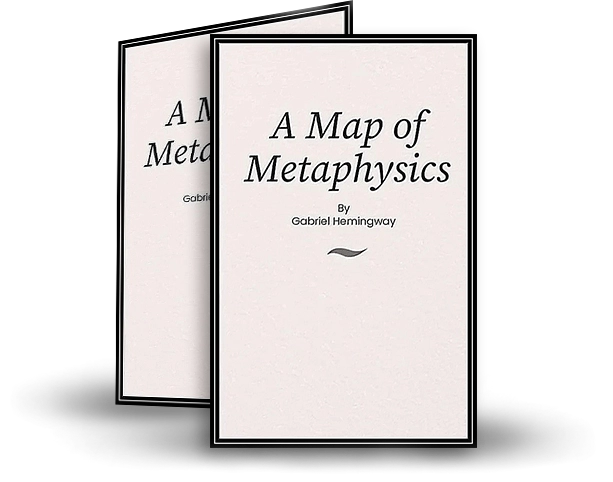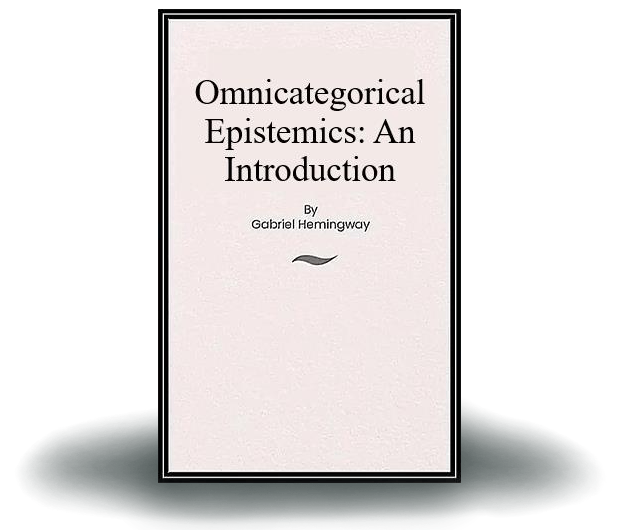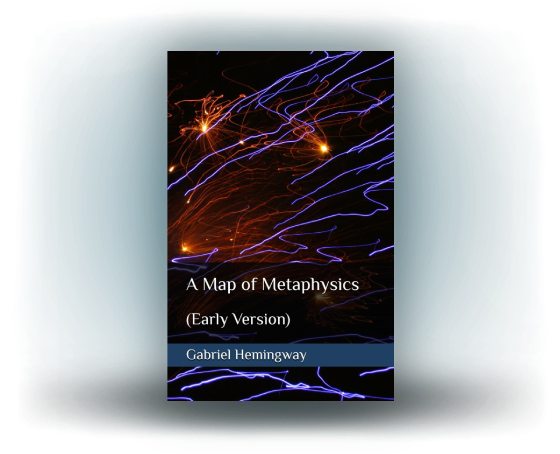My Authorship
Through the lenses of philosophy, art, and poetry, I invite readers to explore the profound connections between thought, creativity, and the human experience. Each book serves as a bridge between intellectual rigor and emotional depth, offering insights that challenges conventional perspectives while celebrating the beauty of expression. Whether dissecting timeless philosophical questions, unraveling the layers of artistic inspiration, or crafting evocative poetry, my work resonates with those seeking meaning and wonder in life's complexities.
With a distinct voice that blends scholarly inquiry with artistic vision, I want to establish a unique space where ideas and emotions converge, inspiring readers to think, feel, and see the world anew.
An Essay on Reality Paperback
– November 8, 2023, by Gabriel Hemingway (Author)
I have aspired to be competent primarily in philosophy within my works mainly due to the fact that I am planning on obtaining a doctorate in philosophy as of writing this in the next decade or so. Now regarding my music, I have crafted two EPs and quite a few singles that may be of interest to you. I have been making music since 2021 or so, and it have been another outlet for my creative expression that I thoroughly enjoy.

APHORISMS, Vol.1
Paperback – June 4, 2024,by Gabriel Hemingway (Author)
Aphorisms, Vol. 1 is a reflective and thought-provoking collection of statements and observations drawn from the author's years of philosophical exploration. This volume brings together a diverse range of insights, each encapsulating profound truths and inquiries into existence, ethics, and the nature of reality. With clarity and precision, the aphorisms explore the complexities of human thought, offering readers a compact yet rich experience of philosophical wisdom. Whether challenging conventional ideas or sparking deeper contemplation, this collection serves as a testament to the author's intellectual journey and their unique perspective on the world.
College Writings, Vol. 1
Paperback – June 4, 2024,by Gabriel Hemingway (Author)
This book is a brief compilation about my philosophy assignments in my freshman year of college. Feel free to have a look!
Golden Fire: A 25 Poem Collection
Paperback – July 6, 2024,by Gabriel Hemingway (Author)
This is the second poetry book published by the author; it consists of a variety of moods and themes.
Woven Brevity: A 40 Poem Collection
Paperback – November 7, 2021, by Gabriel Hemingway (Author)
This is a collection of 40 poems which is intended to stimulate that art-filled sense in the reader. It may also provide inspiration to those wanting to write more poetry.
Calig Soul
Paperback – December 17, 2021,by Gabriel Hemingway (Author)
This is an art book composed over the course of a month. It contains different calligraphy designs intended to be pleasing to the eye.
A Map of Metaphysics (Early Version)
Paperback – November 3, 2025 by Gabriel Hemingway (Author)
This is an early version of the up and coming A Map of Metaphysics. This version is designed to be of convenient use while the full manuscript is being developed.
Collections, Vol. 1
Paperback – April 13, 2025 by Gabriel Hemingway (Author)
This book contains nearly all of my written work as an author since 2021. It offers a convenient, single-volume edition for readers to explore and reference at their leisure. The contents primarily consist of poetry, philosophy, and related subjects. New editions in the Collections series will likely be released every five years or so.
Up and coming books
A map of metaphysics
By Gabriel Hemingway
A Map of Metaphysics is an ambitious exploration of the fundamental structures of reality, thought, and existence. Blending rigorous analysis with a visionary approach, this book seeks to chart the vast and often elusive terrain of metaphysics, offering readers both a conceptual framework and a philosophical journey.
Through a synthesis of classical and modern perspectives, A Map of Metaphysics examines questions of being, causality, time, consciousness, and the limits of human understanding. It navigates the intersections of reason and intuition, logic and experience, structure and emergence—acknowledging both the necessity of systems and the inevitability of paradox.
This work is written for thinkers who seek depth, clarity, and a sense of intellectual adventure. Whether one is well-versed in metaphysical traditions or simply drawn to the deepest questions of existence, A Map of Metaphysics offers a guide to navigating the complex yet profoundly meaningful landscapes of reality.


the concept of nonlinearity
By Gabriel Hemingway
The Concept of Nonlinearity is a deep and technical exploration of how nonlinear structures shape reality, thought, and understanding. Moving beyond conventional, linear approaches to philosophy, this book examines the intricate, interconnected, and often unpredictable nature of existence.
Drawing from metaphysics, epistemology, science, art, and literature, The Concept of Nonlinearitychallenges deterministic and reductionist models, proposing instead a view of reality that embraces complexity, feedback loops,emergent properties, and discontinuities. It considers how nonlinear dynamics manifest in causality, time, and knowledge, as wellas in the structures of artistic expression and literary narrative. From the fragmented compositions of modernist literature tothe recursive patterns of visual art, this book explores how nonlinearity is not only a feature of reality but also a fundamentalprinciple in human creativity and meaning-making.
This work is for those who seek to engage with philosophy at its most abstract yet applicable level—offering a rigorous, conceptual framework for understanding a world that does not move in straight lines.
philosophy through education
By Gabriel Hemingway
Philosophy Through Education is an inquiry into the deep and reciprocal relationship between philosophy and the process of learning. Rather than treating education as a mere vehicle for transmitting knowledge, this book explores how philosophical thinking is both a foundation for and a product of true education.
Drawing from classical and modern philosophical traditions, Philosophy Through Education examines the ways in which learning shapes our understanding of reality, ethics, and selfhood. It considers how education fosters critical thinking, creativity, and the ability to engage with complex ideas—challenging the notion that philosophy is confined to abstract speculation. By exploring themes such as knowledge formation, intellectual discipline, and the role of inquiry in human development, this book argues that education is not just a method of acquiring information but a practice of cultivating wisdom.

For philosophers, educators, and anyone interested in the transformative power of learning, Philosophy Through Education offers a thought-provoking framework for understanding how knowledge, growth, and meaning are intricately intertwined.

structure of the omnivable
By Gabriel Hemingway
Structure of the Omnivable is a metaphysical exploration of the totality of Being, conceptualized as the Omnivable—unlimited infinity encompassing all existence. The book examines its structural principles, the nature of infinite reality, and the interplay between order and boundlessness. Through deep philosophical inquiry, it seeks to uncover how the Omnivable manifests, relates to perception, and informs our understanding of existence itself.
The science of interdisciplinarity
By Gabriel Hemingway
The Science of Interdisciplinarity explores the fundamental principles, methodologies, and applications of interdisciplinary thinking, offering a comprehensive guide to understanding how knowledge can be integrated across fields. It delves into the cognitive and epistemological foundations of interdisciplinarity, examining how the human mind synthesizes complex ideas from diverse disciplines. Drawing from systems theory, complexity science, and the philosophy of knowledge, the book presents frameworks for navigating the boundaries between the sciences, humanities, and arts. Through historical analysis and contemporary case studies, it illustrates how polymathic thinkers and interdisciplinary collaborations have driven intellectual progress, from the Renaissance to the age of artificial intelligence.
Beyond theory, this book serves as a roadmap for the future of interdisciplinary education, research, and problem-solving in an increasingly complex world. It addresses the institutional challenges of siloed knowledge while proposing strategies for fostering a culture of integration in academia, technology, and beyond. With a focus on real-world applications, from addressing global crises to advancing AI-driven knowledge synthesis, The Science of Interdisciplinarity envisions a paradigm shift toward a more unified understanding of reality. It is a call to action for scholars, educators, and thinkers who seek to bridge the gaps between disciplines and embrace the power of interconnected knowledge.


Omnicategorical Epistemics
By Gabriel Hemingway
An Introduction is a groundbreaking exploration into the structure of knowledge itself—where logic, philosophy, and interdisciplinarity converge. In this foundational text, Gabriel Hemingway develops the theory of Omnicategorical Epistemics (OCE), a framework that uses the mathematical language of category theory to unify disparate modes of knowing. Rather than treating epistemology as confined to specific domains or methods, OCE proposes that knowledge is best understood through its transformations, relations, and mappings across fields—what Hemingway terms “epistemic morphisms.” This book lays the groundwork for a new kind of metaphysical understanding: one that is formal yet fluid, rigorous yet creatively expansive.
At its core, Omnicategorical Epistemics invites readers to see knowledge not as a static accumulation, but as a living system of interrelated forms. Each discipline—whether philosophy, science, art, or spirituality—can be treated as a categorical object, and their interconnection becomes the true site of insight. Drawing inspiration from process philosophy, structuralism, and non-classical logics, Hemingway articulates an epistemology that embraces ambiguity, transformation, and plurality. This introduction is not merely theoretical—it offers a vision for education, inquiry, and synthesis in a world that increasingly demands intellectual agility and integrative thinking.










